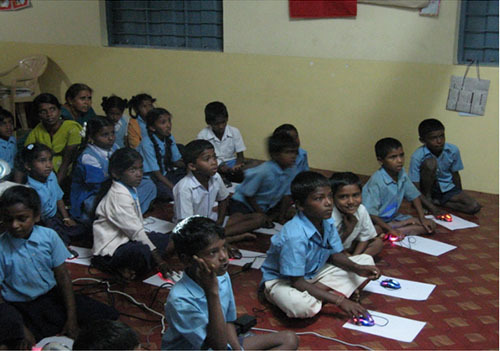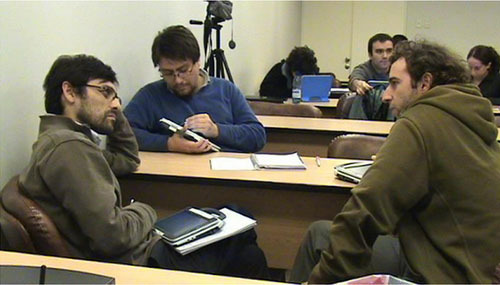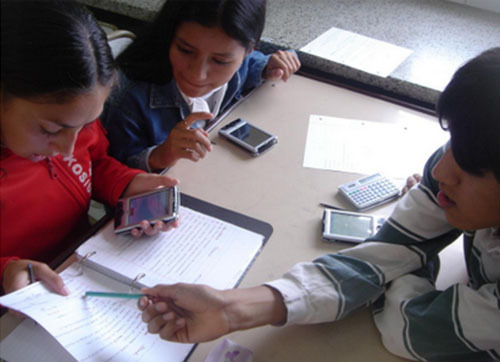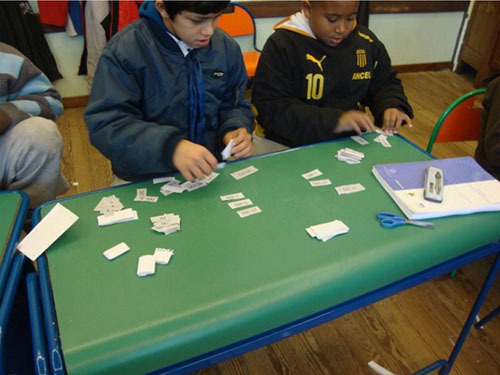
"Globally, more than 6.5 billion mobile contracts exist today. If each person has two contracts, then mobile is already in the hands of around half the world."
-- Gavin Dykes
The latest Education Fast Forward debate (EFF11) focused on which elements we should consider when we create a digital model to improve learning.
Investment in technology is on the increase. Some continue to claim it hurts the classroom. Others are more convinced it is transforming the classroom in a positive way. However, most now believe it's all about getting the execution of your ICT implementation plan right; simply providing the technological devices does not lead to an improvement in learning. The goal must be about transforming the learning process from teacher-centered to student-centered.
One major thinker who has come up with a cohesive program is Professor Miguel Nussbaum of the School of Engineering, Pontificia Universidad Catolica de Chile. His developments in this field have been implemented in schools in Argentina, Brazil, Chile, Colombia, Costa Rica, the United States, the UK, Guatemala, India and Sweden, and have been supported by UNESCO. Miguel Nussbaum, along with Senator David Coltart of Zimbabwe and Co-founder and Debate Chair of Education of Fast Forward, Gavin Dykes, join me today in The Global Search for Education to discuss our findings in the EFF11 debate: "Mobile learning for the masses? Realistic expectations and success criteria."

"It is critically important that teachers be trained in the use of new technologies if they (both technologies and teachers) are to be employed to best effect."
-- Senator David Coltart
Miguel, how has technology impacted Chile's education system? What do you see as the pros and cons from a learning standpoint?
There is evidence that technology has not impacted the educational system. This has not only happened in Chile. The main problem is that government lead projects have been targeted to introduce technology without considering the pedagogical practices that are associated to produce learning.
What digital learning tools have been implemented in Chile? How is the role of the teacher impacted by this technology? What additional training or guidance is required for teachers?
The computer ratio to students in Chile is around 1:9. Teachers have not changed their practice in the past 20 years; even when they use technology, the teacher-centered classroom is always present. Teacher training has mainly been focused on the technological aspects and not on the methodological ones. Technology allows us to change the classroom dynamics. If we use it in the same way as teachers commonly teach, no improvement in learning will be achieved. It's about pedagogy not about technology.

"In policy, strategy and leadership, challenges include refining education's balance of content, skills and behaviors, and helping learners of all ages to discover that life and the world can be a wonderful school, but school is not the world and life."
-- Gavin Dykes
How has technology impacted curriculum design in Chile?
Technology has to be considered as one more element in the instructional design. We have to understand how the power of computers can be integrated with conventional resources to achieve the learning goals. If we don't understand how all these resources have to be orchestrated smoothly with the teachers practice, no improvement in learning will be obtained. It's not about being appropriate or not a given resource; it's about how we integrate all these resources in a harmonic way to reach the learning goal.
What strategies need to be put in place to integrate all these resources in a complementary way to reach the learning goal?
We have to teach for the children and not for the curriculum; we have to know our students needs and determine our learning goals following the children's capabilities. Teachers' and students' goals have to be in sync so that both main actors of learning are aligned to maximize the communication possibilities between both. The activities have to be short and diverse so that students maintain their attention in class. Teachers have to be trained not only in technological and curricular knowledge but also on methodology and formative assessment. Teachers have to be coached during a whole academic year to really comprehend, and make part of their own, the transformation of learning practices that want to be introduced.
What steps have you taken in Chile to realize these goals?
We have constructed a set of orchestrated resources to guide teachers to reach a classroom where students are active learners of their pedagogical process. Teacher coaching guidelines have been developed to support them in the transformation to a classroom where students are the active actors.

"The current curriculum has to be redefined for current needs. We are still under the same curricular structure we were 60 years ago. The digital age has arrived and active engagement is needed." -- Dr. Miguel Nussbaum
Gentlemen, what were your most important "take home" points from our EFF11 debate on Mobile learning for the masses?
Gavin Dykes: Globally, more than 6.5 billion mobile contracts exist today. If each person has two contracts, then mobile is already in the hands of around half the world. Mobile is changing our behavior - but is it helping us reach our fullest learning potential?
While we might celebrate the opportunity of communication for so many, we should plan for reaching the second half of our population and improving access to learning for all. That means access to devices, connectivity, support, assessment, learning communities and materials.
We should freshly consider what learning should be. We can use mobile's strength and reach, from simple voice and SMS to the smartest of phones, to learn a new word or phrase each day, to capture portfolios of evidence, to record daily reflections, to identify new opportunities for apps and build them, to be assessed by tracking, and to build and develop our personal learning networks.
Many such practices are recorded in UNESCO's publications. In policy, strategy and leadership, challenges include refining education's balance of content, skills and behaviors, and helping learners of all ages to discover that life and the world can be a wonderful school, but school is not the world and life.
Perhaps this is a game of two halves. Mobile has reached the first half. With further innovation and development, our prize should be extending to the second to develop all human capacity and potential. To achieve that we must raise our collective game, be creative in our learning, teaching, business strategies, in our education policy and leadership, and above all in our collaboration.
David Coltart: Mobile technology can help impoverished communities leapfrog major obstacles such as the shortage of textbooks and other learning materials, which are expensive and hard to distribute in poor third world countries. However, in promoting new technologies it is critically important to ensure that pedagogy, and in particular teacher skills, advance technology. It is critically important that teachers be trained in the use of new technologies if they (both technologies and teachers) are to be employed to best effect.
Miguel Nussbaum: The change in learning will come from the transformation of pedagogy; technology only supports this path. People say assessment is the reason that we cannot change the way we teach. Don't blame assessment, it's just the front end of the curriculum. The current curriculum has to be redefined for current needs. We are still under the same curricular structure we were 60 years ago. The digital age has arrived and active engagement is needed. Let's think in terms of abilities and not in terms of content. Many countries will make a better use of one machine for the teacher than one machine per child. However, we do need active learners. Use the teacher's machine with shared display and one input device per child to give them interactivity to allow them to learn at their own pace.
(All photos are courtesy of Dr. Miguel Nussbaum)
For more information on Dr. Miguel Nussbaum
For more information on Senator David Coltart
For more information on Gavin Dykes
Join me and globally renowned thought leaders including Sir Michael Barber (UK), Dr. Michael Block (U.S.), Dr. Leon Botstein (U.S.), Professor Clay Christensen (U.S.), Dr. Linda Darling-Hammond (U.S.), Dr. MadhavChavan (India), Professor Michael Fullan (Canada), Professor Howard Gardner (U.S.), Professor Andy Hargreaves (U.S.), Professor Yvonne Hellman (The Netherlands), Professor Kristin Helstad (Norway), Jean Hendrickson (U.S.), Professor Rose Hipkins (New Zealand), Professor Cornelia Hoogland (Canada), Honourable Jeff Johnson (Canada), Mme. Chantal Kaufmann (Belgium), Dr. EijaKauppinen (Finland), State Secretary TapioKosunen (Finland), Professor Dominique Lafontaine (Belgium), Professor Hugh Lauder (UK), Professor Ben Levin (Canada), Lord Ken Macdonald (UK), Professor Barry McGaw (Australia), Shiv Nadar (India), Professor R. Natarajan (India), Dr. Pak Tee Ng (Singapore), Dr. Denise Pope (US), Sridhar Rajagopalan (India), Dr. Diane Ravitch (U.S.), Richard Wilson Riley (U.S.), Sir Ken Robinson (UK), Professor PasiSahlberg (Finland), Professor Manabu Sato (Japan), Andreas Schleicher (PISA, OECD), Dr. Anthony Seldon (UK), Dr. David Shaffer (U.S.), Dr. Kirsten Sivesind (Norway), Chancellor Stephen Spahn (U.S.), Yves Theze (LyceeFrancais U.S.), Professor Charles Ungerleider (Canada), Professor Tony Wagner (U.S.), Sir David Watson (UK), Professor Dylan Wiliam (UK), Dr. Mark Wormald (UK), Professor Theo Wubbels (The Netherlands), Professor Michael Young (UK), and Professor Minxuan Zhang (China) as they explore the big picture education questions that all nations face today.
The Global Search for Education Community Page
C. M. Rubin is the author of two widely read online series for which she received a 2011 Upton Sinclair award, "The Global Search for Education" and "How Will We Read?" She is also the author of three bestselling books, including The Real Alice in Wonderland, is the publisher of CMRubinWorld, and is a Disruptor Foundation Fellow.

